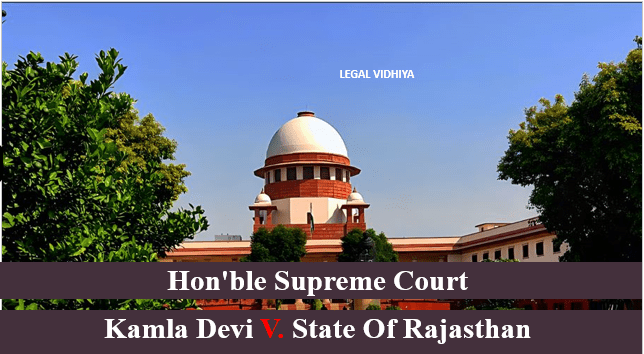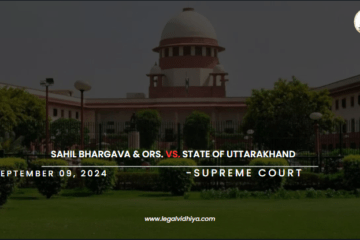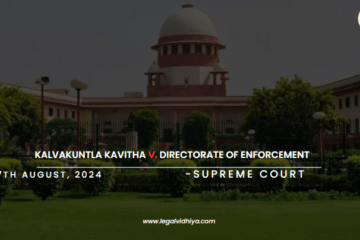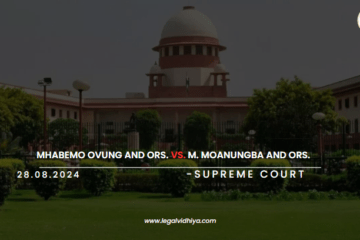
| CITATION | CRIMINAL APPEAL NO. 342 & 343 OF 2022 |
| DATE OF JUDGMENT | 11 March, 2022 |
| COURT | SUPREME COURT OF INDIA |
| APPELLANT | KAMLA DEVI |
| RESPONDENT | STATE OF RAJASTHAN |
| BENCH | M.R. Shah, B.V. Nagarathna |
INTRODUCTION
The case of “Kamla Devi v. State of Rajasthan, 2022 revolves around a critical legal dispute concerning the grant of bail to the respondent-accused by the High Court. The matter concerns the granting of bail to Kishor Singh and Kalu Singh, the accused, who were taken into custody in relation to FIR No. 229 of 2019, which was filed at Police Station Bhim in the District of Rajsamand, Rajasthan. Kamla Devi has contested the orders that granted the accused bail, contending that the High Court’s use of its discretionary authority was improper.
In its ruling, the Supreme Court decided that factors such as the seriousness and gravity of the offense should be taken into account when determining whether to grant bail. The possibility of the accused evading justice, the effect of the accused’s release on prosecution witnesses, and the possibility of the accused falsifying evidence were among the other considerations taken into account by the Court. Since the High Court had granted the accused bail in a vague and careless manner without providing adequate justification, the Court reversed the contested orders and granted the appeals.
FACTS OF THE CASE
In the case of Kamla Devi v. State of Rajasthan, the appellant, Kamla Devi, was the wife of the deceased, Sohan Singh. She challenged the orders passed by the High Court of Rajasthan at Jodhpur, in S.B. Criminal Miscellaneous Bail Application Nos. 10473 of 2019 and 11546 of 2019, whereby bail has been granted to the two accused, namely, Kishor Singh @ Kishan Singh and Kalu Singh, in connection with FIR No.229 of 2019, registered at Police Station Bhim, District Rajsamand, Rajasthan 123.
The case was heard in the Supreme Court of India, and the judgment was delivered by B.V. Nagarathna and M.R. Shah. The appeals have been preferred by the appellant, Kamla Devi, challenging the orders dated 9th September, 2019 and 17th October, 2019 1.
ISSUES RAISED
1. Whether the High Court judiciously used its discretionary authority to give the accused bail?
2. Whether the grant of bail to the accused by the high court was against the settled principles of law?
CONTENTIONS OF APPEALENT
- The appellant contended that High Court had not properly exercised its discretionary power to grant bail to the respondents−accused in a judicious manner
- The appellant argued that the High Court, in the impugned orders, had failed to consider the severity of the offences alleged against the respondents−accused and the brutal manner in which the offences were committed and attempted to be concealed by throwing the body of the deceased, together with the murder weapon, into a well.
- The appellant emphasized that the trial had just commenced and thirteen witnesses were yet to be examined; therefore, it was imperative that the accused remain under custody, in order to ensure that they did not abscond or tamper with evidences or threaten the family of the deceased and/or witnesses, more so because, the accused had previously attempted to cause disappearance of evidence by disposing off the body of the deceased, together with the lathis used to commit murder, by throwing the same into a well.
- The appellant asserted that the High Court had not assigned reasons for the grant of bail to the respondents−accused and had granted bail by a cryptic order de hors any reasoning, notwithstanding the fact that the accused, if convicted for the offences alleged, could be sentenced to life imprisonment.
- The counsel for the appellant, placed reliance on the decisions of the court in – Kalyan Chandra Sarkar vs. Rajesh Ranjan alias Pappu Yadav & Anr. – [(2004) 7 SCC 528] and, o Ash Mohammad vs. Shiv Raj Singh @ Lalla Bahu & Anr. – [(2012) 9 SCC 446]
CONTENTIONS OF REPONDENT
- The counsel for the respondent submitted that the impugned orders do not suffer from any infirmity warranting interference by this Court. That the appellant and her son, the informant, have narrated an untrue version of events in order to falsely implicate the accused.
- The respondents referred to the contents of the post−mortem report of the deceased dated 15th May, 2019, and contended that the deceased had died as a result of suffering a sudden cardio pulmonary arrest and therefore, the death of the deceased could not be attributed to an assault by the accused.
- It was further submitted that, since the final report as to the cause of death was reserved and was to be finalised based on the forensic laboratory reports, it was rather premature to conclude that the accused had any role to play in the death of the deceased.
- It was further argued that the High Court was not required to conduct an elaborate discussion as to the merits of the case and the evidence on record, at a pre−trial stage. That such exercise, if undertaken by the High Court while deciding a bail application, would prejudice fair trial. That the accused have no criminal antecedents and have been cooperating with the investigation of the case. Therefore, the impugned orders granting bail to the accused do not call for interference by this Court.
- They contended that the deceased could not have been the victim of an assault by the accused because the deceased had passed away from a sudden cardiopulmonary arrest.
JUDGEMENT
The Supreme Court opined that High Court was not right in allowing the applications for bail filed by the respondents accused. The court cancelled their bail bonds and directed the accused to surrender before the concerned jail authorities within two weeks. The court reiterated the primary considerations that needed to be placed at balance while granting the bail – (i) the seriousness of the offence; (ii) the likelihood of the accused fleeing from justice; (iii) the impact of release of the accused on the prosecution witnesses; (iv) likelihood of the accused tampering with evidence. The Court also noted that the prosecution had established a prima facie case as to the guilt of the accused. The Court concluded that the High Court’s decision to grant the accused bail was opaque and careless, lacking any clear justification. The Court concluded that the appellant’s appeals were properly granted and that the High Court erred in granting the bail. The court also mentioned that the when the post-mortem report was read in its entirety, it suggested that the deceased had been murdered. Despite the official cause of death being listed as “cardio pulmonary arrest due asphyxia and venous congestion,” the deceased’s hyoid bone seemed to be broken. They were therefore inclined to believe that the prosecution had proven the accused’s guilt beyond a reasonable doubt. As a result, they did not believe that the subject FIR was filed with the intention of implicating the accused.
ANALYSIS
- Primary factors to be considered by the courts while deciding bail applications – The case delves into the main factors to be taken into consideration in cases of bail and these factors as laid down by the Supreme Court are –
- the seriousness of the offence;
- the likelihood of the accused fleeing from justice;
- the impact of release of the accused on the prosecution witnesses;
- likelihood of the accused tampering with evidence.
- “Reasoning” of the High court while granting bail- The court laid down that it is not necessary for the court to provide for detailed justifications while granting bail (especially, in the cases where the case is in early stages and accused’s claim of guilt would not be materialized as such. But the court also cannot fully separate its decision from the case’s material elements, which include the above-mentioned primary factors.
- Court’s Final Verdict- The court allowed the appeal by the appealants and rejected the bail applications of the accused and termed the order of High Court as arbitrary and lacked any justification.
CONCLUSION
In conclusion, the case of “Kamla Devi v. State of Rajasthan, 2022”, establishes a crucial legal precedent in the realm of bail applications. It lays down the main factors to be taken into account by the court while deciding bail applications, emphasizing four main points. In this instance, the Supreme Court rendered the decision of the High Court of granting bail to the accused as wrong and unjustifiable and rejected the bail plea of the accused. The State may file an appeal against the bail order if no new circumstances have emerged since it was granted. The appeal could argue that the order was erroneous, illegal, or that it was made without considering important details that would have established a prima-facie case against the accused.
REFERENCES
This Article is written by Vimla Choudhary, student of Hidayatullah National Law University; Intern at Legal Vidhiya.
Disclaimer: The materials provided herein are intended solely for informational purposes. Accessing or using the site or the materials does not establish an attorney-client relationship. The information presented on this site is not to be construed as legal or professional advice, and it should not be relied upon for such purposes or used as a substitute for advice from a licensed attorney in your state. Additionally, the viewpoint presented by the author is of a personal nature.




0 Comments